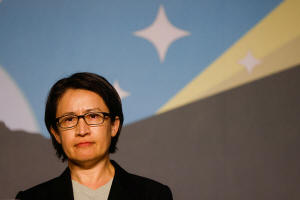Taiwan must invest in building its own 'strengths', vice president-elect
says
 Send a link to a friend
Send a link to a friend
 [May 06, 2024]
TAIPEI (Reuters) - Taiwan is grateful for continued U.S.
security assistance but must invest in building its own "strengths"
first and show the world its support for the island is worth it, Vice
President-elect Hsiao Bi-khim said on Monday. [May 06, 2024]
TAIPEI (Reuters) - Taiwan is grateful for continued U.S.
security assistance but must invest in building its own "strengths"
first and show the world its support for the island is worth it, Vice
President-elect Hsiao Bi-khim said on Monday.
Hsiao, who takes office with President-elect Lai Ching-te on May 20, is
Taiwan's former de facto ambassador to Washington, and is expected to
play a key role in further strengthening ties with the United States
given her fluent English and deep ties in the U.S. capital.
The United States is Chinese-claimed Taiwan's most important supporter
and arms supplier, despite the lack of diplomatic ties.
Speaking to a think-tank forum, Hsiao expressed appreciation for U.S.
President Joe Biden last month signing into law legislation to boost
Taiwan's defenses, part of a broader package of assistance for Ukraine
and Israel.
"This bill demonstrates the U.S.' continuing commitment to supporting
allies and partners in the face of geopolitical challenges," she said.
"But beyond thanking our international friends for their support, it is
important that as Taiwanese we invest in building our own strengths
first," she said.
"Through our own efforts in building a resilient Taiwan, we must have
the confidence that Taiwan is worthy of galvanizing international
support."
China has ramped up its military pressure against Taiwan over the past
four years. Taiwan's government rejects Beijing's sovereignty claims.
Hsiao and Lai - who have pledged to continue President Tsai Ing-wen's
defense self-sufficiency and modernization program - take power just
months before the U.S. presidential election in November.

[to top of second column]
|

Hsiao Bi-khim, running mate of Taiwan President-elect Lai Ching-te,
of Democratic Progressive Party's (DPP), attends a press conference,
following the victory in the presidential elections, in Taipei,
Taiwan January 13, 2024. REUTERS/Ann Wang/File Photo

Former President Donald Trump, whose administration strongly
supported Taiwan and is the presumptive Republican candidate this
time round, has said U.S. allies like European members of NATO have
to spend more on defense and not just rely on the United States
shouldering the burden.
Trump has also been critical of U.S. support for Ukraine following
its invasion by Russia.
In the audience for Hsiao's speech was James Gilmore, Trump's
ambassador to the Organization for Security and Cooperation in
Europe, who is backing Trump's election campaign.
Before Hsiao arrived, Gilmore told the forum, run by Taiwanese
think-tank Center for Asia-Pacific Resilience and Innovation, that
there was a "deliberate effort to inject fear" about Trump amongst
U.S. allies.
"That bill probably could have been stopped," he said, referring
last month's security assistance package.
But Trump backed U.S. House of Representatives Speaker Mike Johnson,
who wanted the bill passed despite objections from some Republican
lawmakers, Gilmore added.
"That would not have happened if we had a potential president there
that was going to be a problem for our allies and for the rest of
the world."
(Reporting by Ben Blanchard; Editing by Michael Perry)
[© 2024 Thomson Reuters. All rights reserved.]This material
may not be published, broadcast, rewritten or redistributed.
Thompson Reuters is solely responsible for this content. |